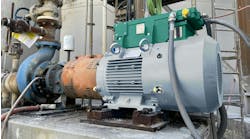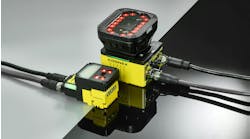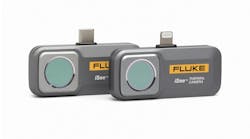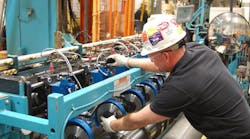Case Study: American Machine Builder Builds a Truly Connected Machine with IIoT
The round slitter blades that cut the paper in JSI’s machines are extremely sharp and can be dangerous to handle manually. Therefore, JSI and Millennium Controls have designed a robotic blade-changing system using a robotic arm from Fanuc Robotics. The robot changes the sharp blades automatically, without operators having to touch them. But even if the blades can be changed automatically, operators still have to go up to the HMI of the machine which puts them in close vicinity to the sharp blades. Therefore, JSI and Millennium Controls looked for a way to access the machine from a distance.
The effects
- Operators avoid contact with sharp slitter blades
- Reduced downtime due to blade changes
- Reduced service costs as service can be done remotely
- Maximized blade life through wear traceability
eWON Cosy allows remote access
To access the machine remotely, JSI and Millennium Controls installed an eWON Cosy from HMS – a remote router that allows users to access the machine via the Internet to do machine monitoring or even programming and maintenance. This means that operators can change blades from a safe distance inside a plant or indeed from anywhere in the world.
The eWON Cosy is connected to the machine’s PLC (a Rockwell ControlLogix L7). The router communicates with the cloud-based eWON Talk2M service where users can log in to access their control
system. It is just like being connected on-site—users see exactly what they would see on the HMIs on-site.
Wireless communication — Anybus Wireless Bolt
With many moving parts in a machine, cabling can be difficult and cumbersome. By mounting an Anybus Wireless Bolt on the paper-slitting machine, JSI can offer wireless communication between the PLC cabinet and different parts of the machine. The Wireless Bolt can communicate via Bluetooth, Bluetooth Low Energy, and Wireless LAN enabling a very robust industrial wireless connection within a range of 100 meters.
Connecting Modbus-TCP stacklight to EtherNet/IP
The Allen Bradley PLC controlling the machine communicates uses EtherNet/IP —the preferred network of Rockwell Automation-based systems. The PLC communicates seamlessly with most other systems and components in the machine, but JSI wanted to use a stacklight to show the current status of the machine, and this stacklight used Modbus-TCP communication. To enable the stacklight to communicate on EtherNet/IP, Millennium Controls suggested HMS’s EtherNet/IP Linking Device, which acts as a translator between the stacklight and the PLC enabling them to communicate. The EtherNet/IP Linking Devices have a unique integration to Studio 5000 Logix designer, allowing for quick and easy connectivity to Modbus-TCP devices.
Anybus gateways from HMS can also be used to connect the entire machine to another industrial network like Modbus-TCP, EtherCAT or PROFINET, if it needs to communicate in a non-Rockwell environment.
“HMS IIoT solutions give us easier maintenance and lower service costs since both we and our customers can troubleshoot and do maintenance remotely,” says Aaron Bloy, Owner and Vice President of Operations at JSI.
A quick project giving JSI a competitive edge
All in all, the implementation of the robotics and the HMS connectivity solutions took no more than 4 months and has provided JSI and its customers with several benefits.
“This is a project that we first developed as a showcase for the Rockwell Automation Fair in Atlanta, but this is already something we offer our customers going forward,” added Aaron Bloy. “Providing our customers with a truly connected machine gives us an advantage as it allows for easier maintenance and lower service costs since both we and our customers can troubleshoot and do maintenance remotely.”










